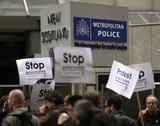
2009-04-28
Hidden away on the Thames Estuary in Kent is a small town. Mobs of men and women, their faces hidden with balaclavas, roam the streets and fight pitched battles with police.
Drawing them into alleyways, they pelt officers with bricks and petrol bombs which explode with an orange 'crump' and blacken the sky with smoke.
But these battles aren't real and nor is the town.
This is the Met Police Public Order training facility, where street riots are simulated to provide training to Territorial Support Group (TSG) officers.

Of course, no riot would be complete without a bunch of marauding journalists getting in the way.
So we're here to add realism while learning how keep ourselves safe.
The BBC and ITN are here too. It's a poignant gathering for us all, so soon after the G20 protests where newspaper seller Ian Tomlinson died.
We'll be training alongside TSG officers who might have 'kettled' us two weeks ago. But that's partly the idea.
Training with each other allows the press pack to understand officers' professional needs and for them to understand ours.
It will make things much easier the next time we meet on the frontline.
We're asked to take part in a role-play exercise. Team Sky News play the rioters, the BBC play themselves.
It's not often you get to hurl abuse at the opposition, but we throw missiles, jostle them and scream obscenities.
They look genuinely nervous at one point (it's only a game, boys) but they play it well and escape with some typically-polite BBC small talk.
"Eating lunch with them in the canteen, it's hard to see them as anything other than an ordinary bunch of coppers who do a difficult job".
Sky reporter Roddy Mansfield
The roles are reversed. Our task is to get an important interview from inside a pub of hostile football-hooligans. The BBC plays the mob well.
They threaten us, separate me from my producer and block the door.
But we misdirect them with an offer of £50 then escape out the back-door without paying them.
There are some "typical Sky News" grumbles from the BBC, which we obviously deny.
We also experience what it's like to be a TSG officer on the front line.
Dressed in full riot gear, we advance down a street while officers pelt us with petrol bombs.
It helps us understand the demands placed on officers - while dressed in so much kit it's hard to walk, let alone run.
So a good exercise for all, but what about the fall-out from the G20?
'Kettled' journalists, missing shoulder-numbers and the death of a bystander - public-order policing is changing and searching questions are being asked.
Many officers feel they get a rough deal. These comments were posted by on the Police Oracle website last week:
"The press have completely demoralised the British Police Service with it's one sided liberally biased and inaccurate reporting of non stories and it's becoming dangerous." NeeNaw - Police Constable
"I have no time for these G20 demonstrators, they can spray them all with petrol as far as I am concerned, and throw in a match, most are people just out for a fight with the police." Maverick22 - Retired Officer
Eating lunch with them in the canteen, it's hard to see them as anything other than an ordinary bunch of coppers who do a difficult job.
But maybe that's the problem; the public often only see the TSG looking like Robocop hitting people with batons or pushing them over.